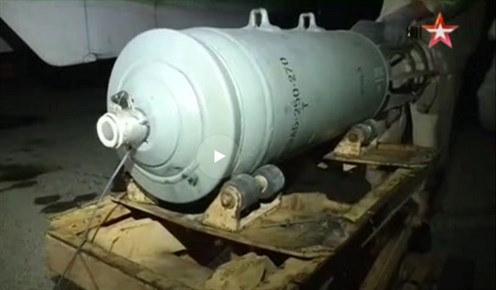02 October 2015
The Russian Federation must not use cluster munitions in Syria

Screen shot of Russian airmen loading an OFAB-250-270 high explosive fragmentation bomb on an SU-24 aircraft. ⒸZvezda TV, 1 October 2015. No cluster munition use by Russia has been recorded in Syria, but Russia's aircraft operating in Syria are capable of using cluster munitions.
Geneva, 1 October 2015 -- The Cluster Munition Coalition (CMC) is urging the Russian Federation to refrain from using any cluster munitions in its military action in Syria, which began on 30 September.
The CMC calls on the 118 nations that are part of the Convention on Cluster Munitions to take immediate action in accordance with the Article 21 (2) of the Convention, to prevent any further use of cluster munitions in Syria or elsewhere.
“We urge the Russian Federation to not use any cluster munitions,” Megan Burke, Director of Cluster Munition Coalition (CMC) said. “These weapons have been banned because they are indiscriminate and unreliable, causing major humanitarian problems and risks to civilians. The people of Syria have already suffered enough.”
The ground attack aircraft and helicopters deployed by the Russian Federation recently to bases in Syria are capable of using cluster munitions of the same types of that the Syrian Air Force have been using since 2012, including Soviet/Russian produced RBK-series cluster bombs containing PTAB, AO, and ShOAB type explosive submunitions.
The Russian Federation has not joined the Convention on Cluster Munitions, but it voted in favour of several UN Security Council resolutions that expressed concern at recent cluster munition use, including the UNSC Resolution of June 2015 regarding evidence of cluster munition use in Sudan. At the UN General Assembly (UNGA) First Committee on Disarmament and International Security in October 2014, the Russian Federation expressed concern at the use of cluster munitions against civilians in Ukraine.
Any use of cluster munitions by the Russian Air Force in Syria will result in endanger Syria’s already beleaguered civilians. This danger is foreseeable and preventable. Cluster munitions cause damage over a very large and imprecise area, and, due to the numbers used and high failure rate, leave behind a great many unexploded submunitions that become de facto antipersonnel landmines.
The CMC has conveyed its concerns and messages through a letter to the Russian Federation.
To date 118 states have joined the Convention on Cluster Munitions, of which 98 are States Parties. The last three countries to join the Convention are Colombia, Somalia and Mauritius.


